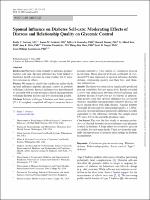Please use this identifier to cite or link to this item:
https://hdl.handle.net/20.500.12202/9366| Title: | Spousal influence on diabetes self-care: Moderating effects of distress and relationship quality on glycemic control |
| Authors: | Gonzalez, Jeffrey S. Soriano, Emily C Lenhard, James M Tennen, Howard Chow, Sy-Miin Otto, Amy K Perndorfer, Christine Shen, Biing-Jiun Siegel, Scott D Laurenceau, Jean-Philippe |
| Keywords: | Continuous glucose monitoring Diabetes distress Relationship quality Social control Type 2 diabetes |
| Issue Date: | 2021 |
| Publisher: | Oxford UP |
| Citation: | Soriano, E. C., Lenhard, J. M., Gonzalez, J. S., Tennen, H., Chow, S.- M., Otto, A. K., Perndorfer, C., Shen, B.-J., Siegel, S. D., & Laurenceau, J.-P. (2021). Spousal Inuence on Diabetes Self-care: Moderating Effects of Distress and Relationship Quality on Glycemic Control. Annals of Behavioral Medicine, 55(2), 123–132. https://doi.org/10.1093/abm/kaaa038 |
| Series/Report no.: | Annals of Behavioral Medicine;55(2) |
| Abstract: | _Abstract_ _Background_ Spouses often attempt to influence patients' diabetes self-care. Spousal influence has been linked to beneficial health outcomes in some studies, but to negative outcomes in others. _Purpose_ We aimed to clarify the conditions under which spousal influence impedes glycemic control in patients with type 2 diabetes. Spousal influence was hypothesized to associate with poorer glycemic control among patients with high diabetes distress and low relationship quality. _Methods_ Patients with type 2 diabetes and their spouses (N = 63 couples) completed self-report measures before patients initiated a 7-day period of continuous glucose monitoring. Mean glucose level and coefficient of variation (CV) were regressed on spousal influence, diabetes distress, relationship quality, and their two- and three-way interactions. _Results_ The three-way interaction significantly predicted glucose variability, but not mean level. Results revealed a cross-over interaction between spousal influence and diabetes distress at high (but not low) levels of relationship quality, such that spousal influence was associated with less variability among patients with low distress, but more among those with high distress. Among patients with high distress and low relationship quality, a 1 SD increase in spousal influence predicted a difference roughly equivalent to the difference between the sample mean CV and a CV in the unstable glycemia range. _Conclusions_ This was the first study to examine moderators of the link between spousal influence and glycemic control in diabetes. A large effect was found for glucose variability, but not mean levels. These novel results highlight the importance of intimate relationships in diabetes management. |
| Description: | Scholarly article / Open Access |
| URI: | https://academic.oup.com/abm/article/55/2/123/5850836 https://hdl.handle.net/20.500.12202/9366 |
| ISSN: | ISSN: 0883-6612, 1532-4796 |
| Appears in Collections: | Ferkauf Graduate School of Psychology: Faculty Publications |
Files in This Item:
| File | Description | Size | Format | |
|---|---|---|---|---|
| Gonzalez 2021 Spousal OA kaaa038.pdf | 448.45 kB | Adobe PDF |  View/Open |
This item is licensed under a Creative Commons License

